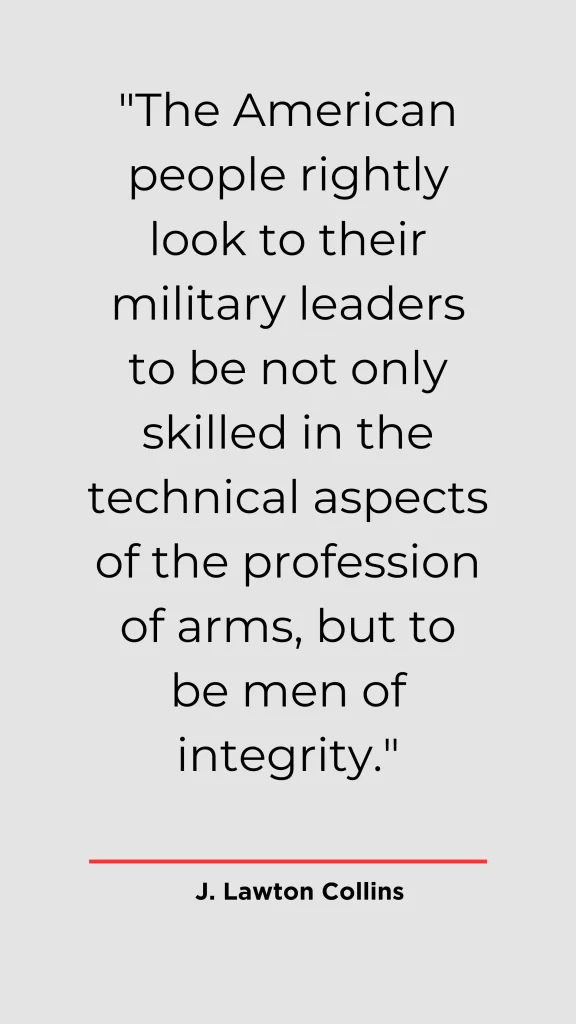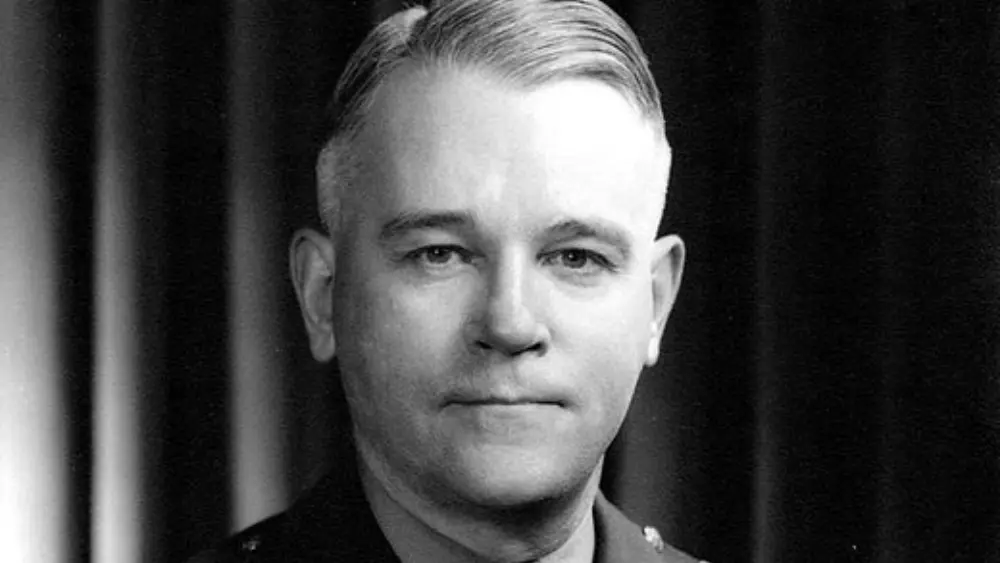J. Lawton Collins, born on May 1, 1896, in New Orleans, Louisiana, was a distinguished American military officer whose career spanned over four decades. Rising through the ranks to become a four-star general, Collins left an impact on U.S. military history. From his early days at West Point through World War II, the Korean War, and beyond, he emerged as a central figure in shaping American military policy and global strategy during some of the most turbulent periods of the 20th century.
Early Life and Education
Born into a family with a strong military background, Collins was inspired by the service of his father and other relatives. Determined to follow a similar path, he entered the United States Military Academy at West Point, where he was exposed to a rigorous curriculum that emphasized leadership, discipline, and tactical training. Graduating in 1917, Collins entered the Army just as the United States was preparing to join World War I. His formal education at West Point laid a solid foundation for what would become an exceptional military career.
His commissioning coincided with a pivotal moment in global history. The Great War was raging in Europe, and Collins was quickly thrust into active service. Though he arrived in France toward the end of World War I, his exposure to the conflict and its aftermath gave him firsthand insight into the challenges of modern warfare. The experiences he accumulated would deeply inform his strategic thinking in later years.
J. Lawton Collins: World War I and the Interwar Period
The years following World War I were marked by transformation and growth for Collins. Unlike many officers who saw limited advancement during the interwar period, he pursued professional military education and served in a variety of key assignments. Among these was a posting to the U.S. Army Infantry School, where he both learned and taught military doctrine. He also attended the Command and General Staff School and the Army War College, further honing his leadership and strategic planning skills.
This era of intellectual development shaped Collins into a thoughtful and capable leader. He viewed military preparedness as a continuous process, one that required constant learning and adaptation. These traits would serve him well as the world once again edged toward global conflict in the late 1930s.
World War II: Tactical Genius and Strategic Force
World War II presented J. Lawton Collins with opportunities to demonstrate the full breadth of his capabilities. Early in the conflict, he took command of the 25th Infantry Division in the Pacific Theater and earned the nickname “Lightning Joe” for leading aggressively and effectively during the Guadalcanal campaign. His operational decisions and ability to inspire troops earned him widespread respect and propelled him to even greater responsibilities.
In 1944, Collins was transferred to Europe, where he took command of VII Corps. Under his leadership, the corps played a crucial role in the Normandy invasion. Collins’s careful planning and assertive leadership during the D-Day landings and subsequent battles across France were instrumental in the Allies’ success. His forces were among the first to break through German lines, a key development that hastened the collapse of Nazi resistance.
Collins’s performance in Europe solidified his reputation as one of the most capable American generals of the war. He possessed a rare combination of tactical skill, strategic insight, and the ability to work effectively with both subordinates and superiors. General Dwight D. Eisenhower came to rely heavily on Collins, who had earned a place among the inner circle of trusted commanders.
Post-War Vision and the Birth of NATO
After World War II, Collins continued to play a vital role in shaping the future of American military power. He was appointed as the Army’s Deputy Chief of Staff for Operations and later the Chief of Staff of the Army. These roles placed him at the forefront of post-war military planning, especially during a period when the U.S. was reorienting its defense posture in response to the growing threat of Soviet expansionism.
Collins became a vocal proponent of collective security and international cooperation. He helped lay the groundwork for the North Atlantic Treaty Organization (NATO), which officially launched in 1949. Recognizing the necessity of a united front against communist aggression, Collins championed policies that emphasized alliance-building and mutual defense. His efforts helped transform NATO from a diplomatic idea into a functioning military alliance capable of deterring aggression in Europe.
Korean War: Leadership at the Highest Levels
With the outbreak of the Korean War in 1950, Collins once again found himself at the center of a major conflict. As Chief of Staff of the Army, he oversaw the rapid deployment of American troops to the Korean Peninsula. His focus was on logistical efficiency, troop readiness, and battlefield strategy. His leadership during this period helped stabilize the front lines and allowed U.S. forces to repel North Korean advances.
Though not directly involved in frontline combat during the Korean War, Collins’s influence was nonetheless profound. He visited Korea multiple times to assess the situation firsthand, coordinate with field commanders, and ensure that U.S. forces had the resources necessary to succeed. His ability to manage a complex war effort from the Pentagon illustrated his versatility and unwavering commitment to mission success.
In addition to his wartime leadership, Collins was instrumental in reorganizing and modernizing the Army. He introduced reforms that improved training, streamlined supply chains, and incorporated new technologies. These changes ensured that the U.S. military remained effective in the face of evolving threats.
Diplomatic Assignments and Continued Public Service
After retiring from active military duty in 1956, Collins continued to serve his country in various diplomatic and advisory roles. He took on the role of U.S. representative to NATO, bringing with him valuable experience and a deep understanding of international security. He worked closely with allied leaders to ensure that NATO remained a cohesive and credible defense organization.
Collins also advised presidential committees, where leaders actively sought his input on national security issues. Presidents Truman, Eisenhower, and Kennedy all valued his judgment and often consulted him on matters ranging from nuclear deterrence to military strategy. He maintained a strong presence in Washington, contributing to the nation’s strategic decisions even after his formal retirement.
Character and Leadership Style
Throughout his career, J. Lawton Collins was admired for his discipline, clarity of thought, and moral integrity. He was known for leading by example, never asking his troops what he wouldn’t do himself. His ability to balance compassion with command made him a respected figure among soldiers and officers alike.
Collins believed in building strong institutions rather than relying solely on individual charisma. He was a systems thinker who understood the importance of organizational culture, education, and training in achieving long-term success. His reforms in the Army helped shape it into a more modern and flexible force, capable of meeting the challenges of a new geopolitical era.

Later Life and Legacy
J. Lawton Collins passed away on September 12, 1987, but his legacy continues to shape the U.S. military. Institutions he helped build, such as NATO and the post-World War II Army structure, remain central to American defense strategy. His influence is also felt in military education, where his writings and speeches continue to inform leadership training and strategic thinking.
Collins’s life is a compelling example of what dedication to service, lifelong learning, and visionary leadership can achieve. He was not content with past achievements but constantly pushed the boundaries of what was possible for the Army and the nation. His story is a reminder that military success depends not only on courage and tactics but also on foresight, collaboration, and a deep commitment to the greater good.
Conclusion
J. Lawton Collins’s journey from a cadet at West Point to one of the most respected generals in American history is a narrative rich with lessons in leadership, resilience, and national service. His contributions spanned major global conflicts, post-war reconstruction, alliance-building, and military reform. At every stage, he demonstrated an ability to adapt to changing circumstances, remain grounded in core values, and inspire those around him.
His work helped ensure American and Allied success during World War II, facilitated the stabilization of Europe through NATO, and supported the U.S. military during the volatile years of the Korean War. Even in retirement, Collins remained an influential figure in matters of defense and diplomacy.
J. Lawton Collins was more than a general; he was a strategist, a reformer, and a servant of the people. His enduring legacy is not just found in the pages of military history books but in the institutions he helped shape and the lives he influenced. His career stands as a model for all who aspire to lead with honor, courage, and vision.











